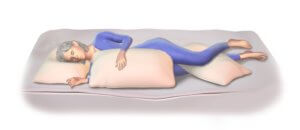
Like any other surgery, a knee joint replacement surgery is also painful and good care needs to be taken during the recovery period. Thus, sleeping correctly with the right amount of support is necessary.
A knee replacement surgery can cause you pain for some days. As you are recovering, the discomfort and pain may make it difficult to sleep. Managing the pain after the surgery includes finding the right sleep position so you can not only sleep comfortably but also speed up your recovery process. Whether you sleep on your back, side, or stomach, the tricks mentioned below may help.
The best sleeping position just after your surgery is sleeping on your back. You should make sure that your operative leg stays as straight as possible to avoid hypertension of the knee and keep proper blood flow to the surgery site.If you are sleeping on your back, put the pillow under your calf and knee. This will not only cushion the knee from pressure but also keep your leg straight. If your pillow is flat, use a second pillow. You must, however, avoid placing the pillow under your foot, as it will put stress on your knees and increase your pain.
Some people find sleeping on their sides more comfortable, and if you are one of them, do not lie on your operative side. Also, put a cushion or pillow between your legs to provide cushion to the knee. In case you need more support, add another pillow to pad your knee to make the leg comfortable.
Sleeping on the side can be painful because the leg is not straight enough. However, gradually, you can start sleeping on your side as the knee heals. But avoid sleeping on the operative side at all costs, as it puts a lot of pressure on the surgery site.

If you sleep on your stomach, after a knee joint replacement surgery, you should refrain from doing so. Lying on your abdomen puts direct pressure on your surgery site and can be very painful.You will heal between 3-6 weeks and after you have recovered, you can begin sleeping normally again. However, if the position you are used to sleeping in causes pain, avoid it for a few more days until you are completely healed.
You will be prescribed to take painkillers several times a day after the surgery. You should make sure that your last dose falls one hour before you sleep so that the medicines show the effect just when you sleep.
One more thing that can be helpful is icing your knee for 15-20 minutes so that the area becomes numb and does not hurt. Put a towel on the area and then place the ice pack. Remove the ice pack and then sleep.
The wedge pillow provides optimum support to your knee while elevating your leg just rightly. However, you will be required to sleep on your back while using a wedge pillow
After knee replacement surgery, several things need to be taken care of. The position you sleep in can affect the recovery time as well as pain caused by the surgery. This is why sleeping in the right position is necessary.
KNOW FROM THE EXPERT OF SHALBY ORTHOPEDICS CENRE OF EXCELLENCE LUCKNOW Shalby Hospitals Ahmedabad, which is renowned all over the world for joint replacement – knee and hip replacement, has opened an orthopedic hospital in Lucknow recently under its chain of Shalby...
Millions of patients around the world have benefited from Joint Replacement (Arthroplasty) as a surgical treatment for end-stage arthritis. India, a nation of 1.4 billion, has a sizable population of people who suffer from hip and knee arthritis. What is Knee Replacement?...
The Healthcare sector is one of the most booming industries globally. Ever Since, the world's transition into the post-pandemic era; Indian medical tourism has risen significantly and is to see a steady upward progression in 2023. Cost effectiveness, access to latest diagnostic...